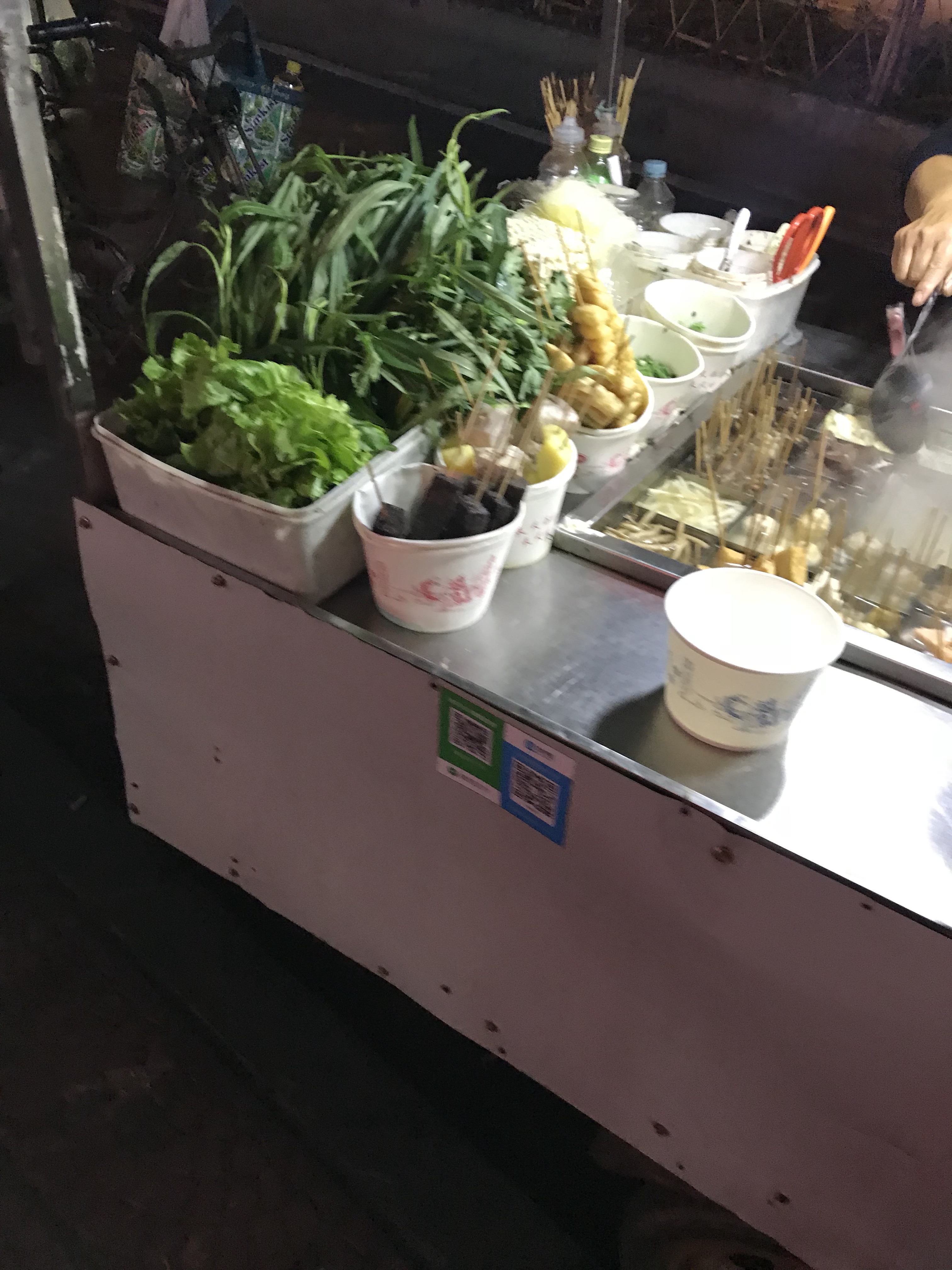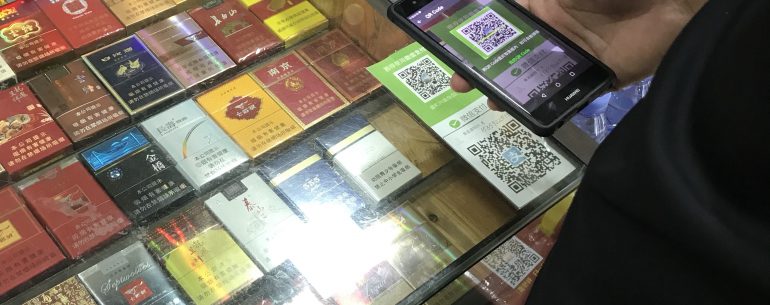You may have read recently about how China leads the world in mobile payment. How people are giving up their bills and change for their more convenient smart phones. How even Chinese airports are striving to become the first cashless airport where you can’t even use cash if you have it.
So what is it like living in a cashless society? Pretty easy.
To be honest, I, a foreigner and and “older” person, was skeptical. I have a healthy distrust for all things technological and was a bit later than most people, especially young people, to adopt this new technology. Also, because I’m a foreigner things are harder for me, and I couldn’t initially join in on the online payment in the early days. (You had to have a Chinese ID number.)
I’m also wary of security and I wanted a buffer between my salary bank account and my online bank account so I had to go specifically to the bank to open a new account and I put it off as long as I could. (Cause these things are a pain, especially for foreigners).

But even with all my misgivings, even with all my concerns, I now literally do not use cash at all in my daily life. I don’t know exactly when the change happened so completely, sometimes within the past 18 months I’d guess, but it has become so all encompassing that when I actually paid for something with cash in a convenient store a few months ago I wasn’t even sure if I could.
“Can I still use cash?” I asked the clerk. I was actually worried I couldn’t.
Because it’s not just me. I’ve stopped using cash but I’ve also stopped seeing cash used. Everything nowadays is done with a QR code that you scan and pay. Going to dinner with friends? Either scan the code and each pay your part or one person pays the full amount and you send them the money on wechat.
Paying your parking garage fee? Scan the code pasted everywhere, add your license plate number and the gate will swing open automatically as you approach the exit. Want a soda from the vending machine? Place your QR code on the machines scanner. As soon as it reads it, it will withdraw the money and your soda will pop out.
There is literally no part of Chinese society that doesn’t let you pay online. Even beggars and buskers have gotten in on it. After all, with no one carrying cash around anymore their source of income has dried up. So now, along with their begging bowls or opened guitar cases, they have QR codes to scan.

This quick widespread use came about in part due to a few reasons. One–credit cards are basically non existent in China. People have debit cards, but a visa/mastercard is virtually impossible to get. You need to apply, deposit a large amount of money in the bank and it’s a huge hassle for Chinese people much less westerners. So there wasn’t a widespread electronic system already in place and most people just used cash.
Two-Chinese people have embraced QR codes. I read an article about westerners being a bit gun shy about scanning codes. But in China we do it for everything. You don’t trade phone numbers with friends, you scan each others QR codes. Wanna register for an event? Scan the events QR code and go to the registration page. Wanna see what’s on the menu? Scan the QR code at the door.
At my favorite sushi place I scan the code at the table and the menu pops up on my phone. I choose what I want, place my order and within a minute the waitress comes over with a printed list of the items I order. When I finish I go to the counter and scan a code again to pay.

QR codes are everywhere. On labels for more information, on the new foreign expert certificate ID card, unlocking rental bikes, paying a hospital bill and more. While QR codes could be abused (a scammer could paste a fake QR code over a real one) it is not a widespread problem yet and people are not put off my it.
The third, and most major reason is because of two companies–Alipay and Wechat. These two apps dominate the market with Alipay (owned by Alibaba) taking 54% of the market and Wechat (owned by Tencent) taking 40%. They are much more than just the “Chinese visa/mastercard” though. In addition to processing payments each company has it’s own apps (Alipay has the shopping giant Taobao and Tencent has the chatting app Wechat) so everyone already uses these apps in their daily life so there is nothing additional you need to get or use.
These are the two apps everyone uses, myself included, and every store, beggar, hospital etc will take one or the other or both. It’s what friends use with friends, or what I use with the little street vendor selling dumplings. There is no hidden fees, no barrier to entry, all you need is a Chinese bank account and one of these apps and you are good to go.

Everyone has their own QR code, in which friends or strangers can scan to pay you, or in the case of wechat, your QR code serves as a business card and can connect you via the app. And once you are friends you can send money directly to each other.
About a year ago I would still get cash out of the ATM, and always bring my wallet with some cash out with me. I long since stopped doing that. I still go to the ATM and make sure to have some cash in my house in case of an emergency but it sits in a drawer untouched for literally months before I force myself to use it. (Don’t want stale money, now do it?) I also stopped bringing my wallet out with me everyday. Most of my friends do the same. All we need is our keys and our phones and we are set for anything.
Of course you could lose your phone, or run out of power, that’s the downside, but cash is just as easy to lose or get stolen. Perhaps easier. On your phone there is a bit more security, first a code to unlock your phone, then a different code when you pay for something. Of course a virus or hacker could break in and drain your bank account (which is why I have a separate bank account, not attached to my salary bank account, for the online payments.) Since there is money involved, there will be ways to steal it, but mobile payments have not proven to be more dangerous or insecure than any other method.

Every now and then a video will show up on my facebook where a foreigner takes the “challenge” of going a whole day in Beijing or Shanghai without spending cash and I always laugh. Because it is not a challenge. In fact, you have to go out of your way to actually use cash. When a street vendor is filling up dumplings, and cooking them on a skillet on a little two-wheeled cart, the last thing they want to deal with it you handing them cash, and they getting your change. If they can just keep cooking, while you pay and show them the online receipt, they are much happier too.
Also, have you seen the statistics of how dirty money is? I like to think with less cash changing hands my chances of a flesh-eating disease is lower too.
Mobile payments still seem like a big deal in America, but here in China it is just an accepted and normal part of life. It’s one of those technologies that goes from novel, to convenient to just a normal part of your life in a span of a few months you don’t even notice. I didn’t even realize how little I use cash until I went back to America this summer and I was forced to use cards or cash to buy thing. (I know America has Apple Pay, but it isn’t as all-encompassing as mobile payment is in China.)
So those wondering what a futuristic world with no cash would look like need look no further than China.



Leave a Reply